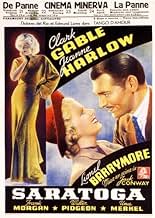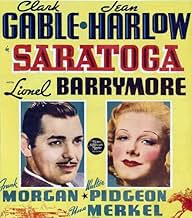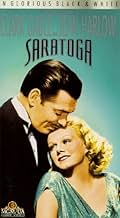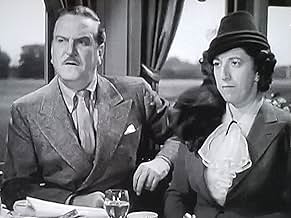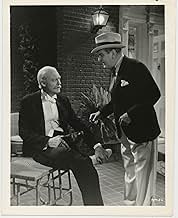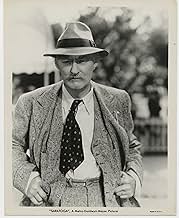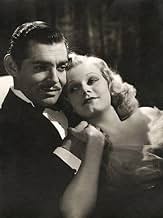ÉVALUATION IMDb
6,5/10
2,1 k
MA NOTE
Ajouter une intrigue dans votre langueAfter winning a stud farm in lieu of gambling debts, bookie Duke Bradley turns an eye to the daughter of the now deceased gambler and her millionaire fiancée.After winning a stud farm in lieu of gambling debts, bookie Duke Bradley turns an eye to the daughter of the now deceased gambler and her millionaire fiancée.After winning a stud farm in lieu of gambling debts, bookie Duke Bradley turns an eye to the daughter of the now deceased gambler and her millionaire fiancée.
- Prix
- 3 victoires au total
Hattie McDaniel
- Rosetta
- (as Hattie McDaniels)
Pat West
- Horse Owner
- (scenes deleted)
Jann Andrews
- One of the Hurley Twins
- (uncredited)
Kathleen Andrews
- One of the Hurley Twins
- (uncredited)
Sheila Andrews
- One of the Hurley Twins
- (uncredited)
Franklyn Ardell
- Passenger on Train
- (uncredited)
Herbert Ashley
- Bartender
- (uncredited)
Avis en vedette
SARATOGA (Metro-Goldwyn-Mayer, 1937), directed by Jack Conway, is a lighthearted comedy with some sadness attached to it. Jean Harlow, it's leading lady, never reached the finish line for this one, having died before completion got underway. Cast for the sixth and final time opposite Clark Gable, this was easily their breeziest assignment together. Walter Pidgeon, making his MGM debut, rounds out the trio playing the other man competing for his girl's affections.
With full indication of a horse racing story, the film's introduction starts off with the camera capturing the full view of racing hoofs as jockeys ride up the racetrack before the rising dust covers the screen as the credits roll to upbeat swing music of unseen vocalist belting out its title tune. Fade in begins at Saratoga's Brookvale Farm where Grandpa Clayton (Lionel Barrymore), a horse-breeder, is disappointed that his son, Fran (Jonathan Hale) has sold off his stallions to banker Ed Kenyon to cover up his financial losses. Because Clayton owes $60,000 back debt to best friend and bookmaker, Duke Bradley (Clark Gable), he offers him the mortgage deed to his property as security. Clayton's daughter, Carol (Jean Harlow), while in London, has become engaged to Hartley Madison (Walter Pidgeon), a wealthy New York stockbroker who had taken Duke for $50,000 at Belmont. While at the races, Clayton suffers a fatal heart attack shortly after Carol's return. As Carol calls for Duke to sell her back the farm, he refuses so not to foreclose on her grandfather. Intending on having Hartley give her the money to pay off Duke, Duke has other plans on getting back his losses. Regardless of trying to outbid the rich "sucker" at both auction and racetracks, Carol arranges in keeping Bradley one step ahead of Duke.
Taken from an original screenplay by Anita Loos and Robert Hopkins, the plot revolving around a snobbish girl engaged to a millionaire and becoming attracted to a smooth talking bookie was typical movie-making in the 1930s. Considering the plot being ordinary, the winning combination of Gable and Harlow makes SARATOGA all its worth. With the finished product not going according to plan due to Harlow's untimely death, how the writers managed to work around her character is more interesting than the story itself. Aside from extended use of supporting players Una Merkel (Fritzi, Duke's old flame), and Frank Morgan (Jesse Kiffmeyer, Fritzi's jealous husband allergic to horses), there's also noticeable out-takes revolving around the real Harlow and those featuring her double with face covered by large hats and camera capturing her discreetly from the back. The frequent mention of Carol's illness was certainly an excuse by not keeping her in full view. One surviving scene where Harlow's Carol, examined by Doctor Hanerstein Beard (George Zucco), constantly telling him, "I'm perfectly well. There's nothing the matter with me," comes across as too close for comfort, considering the actual circumstances of her being gravly ill during filming.
On the lighter side, Harlow demonstrates her flare for comedy in a memorable scene where she claims to have picked up cigar smoking to avoid any detection of Duke's presence in her room (who's hiding underneath her bed) from her fiancé' Bradley, after noticing the burning cigar resting on her ashtray. Gable comes across as very likable through his constant catch phrase to everyone, male or female, "I love you." When Carol uses it on Duke, he replies amusingly, "Hey, what are you trying to do, steal my gag line?" In between the battle of wits come song interludes by Walter Donaldson, Robert Wright and Chet Forrest: "Saratoga" (sung by Grace Saxon and the Four Esquires); "The Horse With the Dreamy Eyes" (sung by Cliff Edwards, Una Merkel, Clark Gable and Hattie McDaniel); "Saratoga" and reprise of "The Horse With the Dreamy Eyes." The Horse song, set on the "The Racing Special" train bound to and from Miami, is noteworthy as one of the rare cases where Gable participates in a song, and quite good at that.
Rounding out the cast of co-stars include Hattie McDaniel as Rosetta Washington, Harlow's maid; Cliff Edwards as "Tip" O'Brien; Frankie Darro the jockey, Dixie Gordon; and Margaret Hamilton appearing as the homely woman on the train seated next to Jesse (Morgan), founder of Harriet Hale Beauty Cream. Lionel Barrymore, a reliable actor, is nearly unrecognizable with his Claude Gillingwater Sr.-type performance playing the aging grandpa sporting silver hair and droopy mustache.
Regardless of title, not every scene takes place in Saratoga, but at Tropical Park in Miami, Florida, and at Churchill Downs in Louisville, Kentucky. Highlighting with a horse race sequence between Moonray and Dubonnet leading to a photo finish, SARATOGA concludes with its own photo finish with that of Jean Harlow (1911-1937) in a fond farewell to her work. To echo those words of Gable's Duke Bradley, fans would gladly say, "Jean, we love you." Formerly available on video cassette in the 1990s, SARATOGA is certainly a sure bet whenever presented on Turner Classic Movies. (*** markers)
With full indication of a horse racing story, the film's introduction starts off with the camera capturing the full view of racing hoofs as jockeys ride up the racetrack before the rising dust covers the screen as the credits roll to upbeat swing music of unseen vocalist belting out its title tune. Fade in begins at Saratoga's Brookvale Farm where Grandpa Clayton (Lionel Barrymore), a horse-breeder, is disappointed that his son, Fran (Jonathan Hale) has sold off his stallions to banker Ed Kenyon to cover up his financial losses. Because Clayton owes $60,000 back debt to best friend and bookmaker, Duke Bradley (Clark Gable), he offers him the mortgage deed to his property as security. Clayton's daughter, Carol (Jean Harlow), while in London, has become engaged to Hartley Madison (Walter Pidgeon), a wealthy New York stockbroker who had taken Duke for $50,000 at Belmont. While at the races, Clayton suffers a fatal heart attack shortly after Carol's return. As Carol calls for Duke to sell her back the farm, he refuses so not to foreclose on her grandfather. Intending on having Hartley give her the money to pay off Duke, Duke has other plans on getting back his losses. Regardless of trying to outbid the rich "sucker" at both auction and racetracks, Carol arranges in keeping Bradley one step ahead of Duke.
Taken from an original screenplay by Anita Loos and Robert Hopkins, the plot revolving around a snobbish girl engaged to a millionaire and becoming attracted to a smooth talking bookie was typical movie-making in the 1930s. Considering the plot being ordinary, the winning combination of Gable and Harlow makes SARATOGA all its worth. With the finished product not going according to plan due to Harlow's untimely death, how the writers managed to work around her character is more interesting than the story itself. Aside from extended use of supporting players Una Merkel (Fritzi, Duke's old flame), and Frank Morgan (Jesse Kiffmeyer, Fritzi's jealous husband allergic to horses), there's also noticeable out-takes revolving around the real Harlow and those featuring her double with face covered by large hats and camera capturing her discreetly from the back. The frequent mention of Carol's illness was certainly an excuse by not keeping her in full view. One surviving scene where Harlow's Carol, examined by Doctor Hanerstein Beard (George Zucco), constantly telling him, "I'm perfectly well. There's nothing the matter with me," comes across as too close for comfort, considering the actual circumstances of her being gravly ill during filming.
On the lighter side, Harlow demonstrates her flare for comedy in a memorable scene where she claims to have picked up cigar smoking to avoid any detection of Duke's presence in her room (who's hiding underneath her bed) from her fiancé' Bradley, after noticing the burning cigar resting on her ashtray. Gable comes across as very likable through his constant catch phrase to everyone, male or female, "I love you." When Carol uses it on Duke, he replies amusingly, "Hey, what are you trying to do, steal my gag line?" In between the battle of wits come song interludes by Walter Donaldson, Robert Wright and Chet Forrest: "Saratoga" (sung by Grace Saxon and the Four Esquires); "The Horse With the Dreamy Eyes" (sung by Cliff Edwards, Una Merkel, Clark Gable and Hattie McDaniel); "Saratoga" and reprise of "The Horse With the Dreamy Eyes." The Horse song, set on the "The Racing Special" train bound to and from Miami, is noteworthy as one of the rare cases where Gable participates in a song, and quite good at that.
Rounding out the cast of co-stars include Hattie McDaniel as Rosetta Washington, Harlow's maid; Cliff Edwards as "Tip" O'Brien; Frankie Darro the jockey, Dixie Gordon; and Margaret Hamilton appearing as the homely woman on the train seated next to Jesse (Morgan), founder of Harriet Hale Beauty Cream. Lionel Barrymore, a reliable actor, is nearly unrecognizable with his Claude Gillingwater Sr.-type performance playing the aging grandpa sporting silver hair and droopy mustache.
Regardless of title, not every scene takes place in Saratoga, but at Tropical Park in Miami, Florida, and at Churchill Downs in Louisville, Kentucky. Highlighting with a horse race sequence between Moonray and Dubonnet leading to a photo finish, SARATOGA concludes with its own photo finish with that of Jean Harlow (1911-1937) in a fond farewell to her work. To echo those words of Gable's Duke Bradley, fans would gladly say, "Jean, we love you." Formerly available on video cassette in the 1990s, SARATOGA is certainly a sure bet whenever presented on Turner Classic Movies. (*** markers)
Not a great movie, it doesn't have the expected chemistry between Gable and Harlow, but many bits of trivia connected with it. It was released as I understand it after public pressure for another look at her. It ended up being her most financially successful film. I think that the cigar scene is one of her best, most understated comic moments.
I don't know of another film finished after its star's death like this. For that alone it is a curiosity. The added footage is very obvious, comical yet macabre. And the ongoing bit about her being sick is equally macabre.
As for the trivia, you have one of Lionel Barrymore's last ambulatory roles; longtime MGM contractee Walter Pidgeon in his first MGM role; Hattie McDaniel singing; The Wizard of Oz having breakfast with the Wicked Witch of the West; and Clark Gable playing probably the only nice bookie in the history of the movies (sort of nice, to Harlow's father at least).
For Harlow at her best, go with Personal Property, Red Dust or Bombshell, but watch this for the trivia.
I don't know of another film finished after its star's death like this. For that alone it is a curiosity. The added footage is very obvious, comical yet macabre. And the ongoing bit about her being sick is equally macabre.
As for the trivia, you have one of Lionel Barrymore's last ambulatory roles; longtime MGM contractee Walter Pidgeon in his first MGM role; Hattie McDaniel singing; The Wizard of Oz having breakfast with the Wicked Witch of the West; and Clark Gable playing probably the only nice bookie in the history of the movies (sort of nice, to Harlow's father at least).
For Harlow at her best, go with Personal Property, Red Dust or Bombshell, but watch this for the trivia.
Jean Harlow and Clark Gable teamed up for the last time in this light film, "Saratoga," about a young woman, her wealthy fiancée (Walter Pidgeon), and the horse breeding farm deeded to a bookie (Gable) to pay off a gambling debt. Harlow wants to handicap horses and lay bets to pay off the marker, and Gable wants to take her boyfriend on a long ride to poverty by taking his bets.
I can't imagine how disheartening it was for the actors, director, and crew to have to finish the film after Jean Harlow's untimely death. Unfortunately, the film for viewers soon becomes how they camouflaged the fact that her stand-in and a vocal imitator completed the picture. Most disconcerting is a large party scene, where the internal sections feature the stand-in, and the external ones on the terrace are with Harlow. All of the race track scenes were obviously done last, with the stand-in hiding her face with binoculars. And there is one scene where she is completely covered with a picture hat. The character's only appearances at the end of the film are at the race track and, back turned, in the race track office. The ending shot is actually from an earlier scene, or it was done at the same time the earlier scene was filmed.
Despite being ill during the production, Harlow is wonderful in her final role and she and Gable have excellent chemistry. She truly was one of the great screen presences, just delightful in every way. Walter Pidgeon is young and handsome, and despite having to say "I love ya" dozens of times, Gable is likable, relaxed, and handsome. It just all seems very disjointed. And very sad.
I can't imagine how disheartening it was for the actors, director, and crew to have to finish the film after Jean Harlow's untimely death. Unfortunately, the film for viewers soon becomes how they camouflaged the fact that her stand-in and a vocal imitator completed the picture. Most disconcerting is a large party scene, where the internal sections feature the stand-in, and the external ones on the terrace are with Harlow. All of the race track scenes were obviously done last, with the stand-in hiding her face with binoculars. And there is one scene where she is completely covered with a picture hat. The character's only appearances at the end of the film are at the race track and, back turned, in the race track office. The ending shot is actually from an earlier scene, or it was done at the same time the earlier scene was filmed.
Despite being ill during the production, Harlow is wonderful in her final role and she and Gable have excellent chemistry. She truly was one of the great screen presences, just delightful in every way. Walter Pidgeon is young and handsome, and despite having to say "I love ya" dozens of times, Gable is likable, relaxed, and handsome. It just all seems very disjointed. And very sad.
Ordinary comedy would have been a cinematic footnote and a stop gap for Gable and Harlow before their next scheduled pairing on loan to Fox for the much more worthwhile In Old Chicago if not for Jean's sudden death. Instead it ended up becoming the second most profitable film of 1937 and a notorious cash grab for Metro.
Not really a bad film but hardly the best film on any of the actors resumes. Other than the ghoulish, rather easy, game of spotting the scenes filmed after Jean's passing with a stand-in the film is packed with great character actors and actresses doing good work. Of particular note is Una Merkel, sassy and smart as an old crony of Gable's. Jean's part is one that's far away from her more famous early persona as a brassy good time girl but in line with the more refined lady-like roles Mayer was moving her towards after Irving Thalberg's death and which she had been transitioning to nicely. Considering the fact that it's an incomplete performance she is fine in her role, she looks weary and a bit bloated throughout not surprisingly since unbeknownst to all her kidneys were failing.
Her death actually caused great upheaval in many films that were in development at the time changing the course of many careers. She and Gable were to head over to Fox for In Old Chicago which proved a boon to Alice Faye and Tyrone Power. For their services Shirley Temple was to be loaned to MGM for the Wizard of Oz, when that fell through of course Judy Garland was cast pulling her out and Ann Rutherford in to the small part of Carreen in GWTW. Also among many other planned projects Maisie, originally planned as an A production but moved to the B unit after the loss of Jean, was allocated to Ann Sothern so successfully that it started her on a series that ran, between other films, almost ten years.
Not really a bad film but hardly the best film on any of the actors resumes. Other than the ghoulish, rather easy, game of spotting the scenes filmed after Jean's passing with a stand-in the film is packed with great character actors and actresses doing good work. Of particular note is Una Merkel, sassy and smart as an old crony of Gable's. Jean's part is one that's far away from her more famous early persona as a brassy good time girl but in line with the more refined lady-like roles Mayer was moving her towards after Irving Thalberg's death and which she had been transitioning to nicely. Considering the fact that it's an incomplete performance she is fine in her role, she looks weary and a bit bloated throughout not surprisingly since unbeknownst to all her kidneys were failing.
Her death actually caused great upheaval in many films that were in development at the time changing the course of many careers. She and Gable were to head over to Fox for In Old Chicago which proved a boon to Alice Faye and Tyrone Power. For their services Shirley Temple was to be loaned to MGM for the Wizard of Oz, when that fell through of course Judy Garland was cast pulling her out and Ann Rutherford in to the small part of Carreen in GWTW. Also among many other planned projects Maisie, originally planned as an A production but moved to the B unit after the loss of Jean, was allocated to Ann Sothern so successfully that it started her on a series that ran, between other films, almost ten years.
When you watch this film, you are overwhelmed with sadness realizing that Jean Harlow died during production. Adding to that, Jean was never better than she is in this film. First of all, MGM finally found her 'look.' Her make-up is toned down and her platinum blonde hair is now a darker shade. She never looked lovelier. But what really is remarkable is her acting skills. She developed such a natural style and her comic ability was absolutely flawless.
From what I've read, Miss Harlow was liked by all in the industry, and loved by those who were close to her. Dying a such a young age (26), one can only imagine how many more years her career would have flourished.
Almost 65 years have passed since her death and she's still one of Hollywood's greatest stars.
From what I've read, Miss Harlow was liked by all in the industry, and loved by those who were close to her. Dying a such a young age (26), one can only imagine how many more years her career would have flourished.
Almost 65 years have passed since her death and she's still one of Hollywood's greatest stars.
Le saviez-vous
- AnecdotesIn May of 1937, with the film about 90% completed, Jean Harlow collapsed on the set and died about a week later, reportedly of uremic poisoning. Her remaining scenes were shot with double Mary Dees being filmed only from behind. Paula Winslowe supplied the voice.
- GaffesIn opening credits, last name of Hattie McDaniel is listed as "McDaniels."
- Citations
Fritzi 'Muggins' Kiffmeyer: We women can do things to a man we love that men wouldn't do to a rattlesnake.
- ConnexionsFeatured in MGM: When the Lion Roars: The Lion Reigns Supreme (1992)
- Bandes originalesSaratoga
(1937) (uncredited)
Music by Walter Donaldson
Lyrics by Bob Wright and Chet Forrest
Sung during credits by Grace Saxon and Four Esquires
Reprised by them at a party
Meilleurs choix
Connectez-vous pour évaluer et surveiller les recommandations personnalisées
- How long is Saratoga?Propulsé par Alexa
- Jean Harlow---Was She Murdered?
Détails
Box-office
- Budget
- 1 144 000 $ US (estimation)
- Durée1 heure 32 minutes
- Couleur
- Rapport de forme
- 1.37 : 1
Contribuer à cette page
Suggérer une modification ou ajouter du contenu manquant




